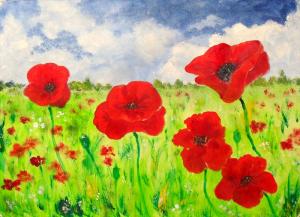Taps by Marisa3 Artwork by suzannethompson2 at FanArtReview.com |
 Taps was first arranged in its present form by Union Army Brigadier General Daniel Butterfield, an American Civil War general. In July of 1862, he commanded its use to replace a previous French bugle call used to signal "lights out." This soon became the custom for both the Union and Confederate armies.
Taps was first arranged in its present form by Union Army Brigadier General Daniel Butterfield, an American Civil War general. In July of 1862, he commanded its use to replace a previous French bugle call used to signal "lights out." This soon became the custom for both the Union and Confederate armies.
Captain John C. Tidball is credited with the custom of playing taps at a military funeral. The following was later recorded in an Officer's Manual: "During the Peninsula Campaign in 1862, a soldier of Tidball's Battery A of the 2nd Artillery was buried at a time when the battery occupied an advanced position concealed in the woods. It was unsafe to fire the customary three volleys over the grave, on account of the proximity of the enemy, and it occurred to Capt. Tidball that the sounding of Taps would be the most appropriate ceremony that could be substituted." He was, Tidball recalled later, "a most excellent man." Thus began the long tradition of honoring our fallen soldiers from the days of the Civil War to present day. This haunting and deeply emotional piece of music has only 24 notes, but there is no piece more compelling, powerful or moving, because of what it denotes. When I hear Taps played, I think of all the millions of young, beautiful faces that have stepped up to answer their country's call to arms. They have proudly slipped on the uniform, stepped onto the decks of ships or military transports and have been summarily taken to far off shores, so many destined not to return. I recall, through stories from my father, the wars of his generation, WWII and Korea and of those close friends of his youth that were lost to these wars; having a friend who was entombed on the Arizona in Pearl Harbor and a brother-in-law who died in the European campaign. And my father's poignant story of having to console his widowed sister and her small son who would never know his father. The major war of my generation was Viet Nam, a far-off country that was only brought to light when we committed our troops to the conflict. I don't think it was actually ever declared a war, but only a police action. Whatever the semantics, 58,000 of our young men and women died there. While much can be and has been said about the Viet Nam war retrospectively, it lingers as a war where we did not honor our beloved soldiers who fought and died there. The spirit of Taps was conspicuously absent for them and I find that to be the saddest thing of all. No matter how we feel about a war being just or unjust (not that any war is by any means just), we need to take a lesson from Viet Nam to never blame our troops for doing what they were called to do; to always honor those who make the ultimate sacrifice for our country. Once again we find ourselves coming to the end of not one but two prolonged wars. Many more of our young people have fallen on foreign soil and will remain forever young. As Herbert Hoover said "Older men declare war. But it is the youth that must fight and die." On this day where we officially honor our dead and as the honor guard faithfully executes its duty in front of the Tomb of the Unknown Soldier, I once again recall the solemn words of Taps: Day is done, gone the sun From the lakes, from the hills, from the sky All is well, safely rest God is nigh. Fading light dims the sight And a star gems the sky, gleaming bright From afar, drawing near Falls the night. Thanks and praise for our days Neath the sun, neath the stars, neath the sky As we go, this we know God is nigh. To our beloved fallen patriots that gave their last full measure and made the ultimate sacrifice, so that we may all remain free, I say to you rest in peace with our eternal love and gratitude. Semper Fi ("Always Faithful")
|
| ©
Copyright 2025.
Marisa3
All rights reserved. Marisa3 has granted FanStory.com, its affiliates and its syndicates non-exclusive rights to display this work. |



